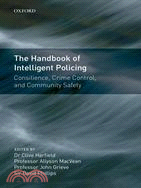Handbook of Intelligent Policing: Consilience, Crime Control, and Community Safety
商品資訊
ISBN13:9780199533121
出版社:Oxford Univ Press USA
作者:Clive Harfield (EDT); Allyson Macvean (EDT); John G. D. Grieve (EDT); David Phillips (EDT)
出版日:2008/10/15
裝訂:平裝
定價
:NT$ 5040 元若需訂購本書,請電洽客服 02-25006600[分機130、131]。
商品簡介
作者簡介
相關商品
商品簡介
In the last twenty-five years, there has been a growing awareness of the role of intelligence within law enforcement activity. This edited volume on intelligence is the first of its kind to draw together in one volume scholarly and practical perspectives on intelligence in policing. In a range of essays from leading experts and practitioners, this book sets out the main concepts and philosophies behind the practical framework for intelligence gathering and analysis in UK policing. The book's four Editors bring a wealth of experience and knowledge to bear upon the subject matter: Sir David Phillips and Professor John Grieve were instrumental in developing and defining the role of intelligence in English policing; Dr Clive Harfield has operational experience managing an intelligence unit and was a national intelligence officer; and Professor Allyson MacVean has practical experience working with the police on issues of dangerous offender management and community impact assessments.
The emphasis on intelligence for the purposes of policing has been expressed theoretically in 'intelligence-led policing'; a mantra repeated by both politicians and senior police officers and suggesting that intelligence is the universal panacea for all ills - from national security to creating safer neighbourhoods. This expression betrays both the potential sophistication of intelligence and the very real implementation problems that practitioners encounter daily. This volume seeks to address these complexities through its discussion of how intelligence has been conceptualised and developed into practical products for the purposes of policing as undertaken not only by the police, but also by partner agencies and other providers.
Divided into four parts, each section of the book begins with a comprehensive overview of the topic written by the Editors. The Editors pose a series of questions which are explored further by expert contributors in a series of essays, each one an important contribution to the treatment of intelligence in policing today. Part One looks at the history and theory of intelligence in policing, reflecting on how the police service arrived at its current approaches to intelligence; Part Two deals with analysis, examining the police relationship with analysts and the various models of analysis; Part Three looks at partnership with other agencies (prisons/local authorities) and draws on case studies to explore how different frameworks can be structured; and Part Four looks to the future and and asks whether intelligence-led policing is the answer.
Contributors include R. Mark Evans, Director of Analytical Services for the Police Service of Northern Ireland and National Manager for Intelligence at New Zealand Police;
Michael Hawley, Federal Agent for the Australian Federal Police;
Professor Betsy Stanko;
and Sir Paul Scott-Lee, Chief Constable at West Midlands Police.
The emphasis on intelligence for the purposes of policing has been expressed theoretically in 'intelligence-led policing'; a mantra repeated by both politicians and senior police officers and suggesting that intelligence is the universal panacea for all ills - from national security to creating safer neighbourhoods. This expression betrays both the potential sophistication of intelligence and the very real implementation problems that practitioners encounter daily. This volume seeks to address these complexities through its discussion of how intelligence has been conceptualised and developed into practical products for the purposes of policing as undertaken not only by the police, but also by partner agencies and other providers.
Divided into four parts, each section of the book begins with a comprehensive overview of the topic written by the Editors. The Editors pose a series of questions which are explored further by expert contributors in a series of essays, each one an important contribution to the treatment of intelligence in policing today. Part One looks at the history and theory of intelligence in policing, reflecting on how the police service arrived at its current approaches to intelligence; Part Two deals with analysis, examining the police relationship with analysts and the various models of analysis; Part Three looks at partnership with other agencies (prisons/local authorities) and draws on case studies to explore how different frameworks can be structured; and Part Four looks to the future and and asks whether intelligence-led policing is the answer.
Contributors include R. Mark Evans, Director of Analytical Services for the Police Service of Northern Ireland and National Manager for Intelligence at New Zealand Police;
Michael Hawley, Federal Agent for the Australian Federal Police;
Professor Betsy Stanko;
and Sir Paul Scott-Lee, Chief Constable at West Midlands Police.
作者簡介
Professor John Grieve QPM is Professor Emeritus and Chair of the John Grieve Centre for Policing at London Metropolitan University, and a former Director of Intelligence for the Metropolitan Police.
Professor Allyson McVean is Director and Founder of the John Grieve Centre for Policing and Community Safety, London Metropolitan University. She has extensive practical experience of working with police forces on issues of dangerous offender management and community impact assessments, and thus brings a third party perspective to the partnership use of intelligence.
Dr Clive Harfield is Deputy Director of the John Grieve Centre for Policing and Community Safety and a police commander and national intelligence officer. Dr Harfield is co-author of two Blackstone's Practical Policing titles, Covert Investigation and Intelligence.
Sir David Phillips is Director of the National Centre of Policing Excellence and former Chief Constable of Kent Police. He was knighted in 2000 for his services to policing and is an honorary fellow of Christ Church, University of Oxford. Sir David is best known for his development of 'intelligence led' policing, his contributions to criminal justice reform and his advocacy of professional skills in investigation. He was a member of the Criminal Justice Council by appointment of the Lord Chancellor.
主題書展
更多
主題書展
更多書展今日66折
您曾經瀏覽過的商品
購物須知
外文書商品之書封,為出版社提供之樣本。實際出貨商品,以出版社所提供之現有版本為主。部份書籍,因出版社供應狀況特殊,匯率將依實際狀況做調整。
無庫存之商品,在您完成訂單程序之後,將以空運的方式為你下單調貨。為了縮短等待的時間,建議您將外文書與其他商品分開下單,以獲得最快的取貨速度,平均調貨時間為1~2個月。
為了保護您的權益,「三民網路書店」提供會員七日商品鑑賞期(收到商品為起始日)。
若要辦理退貨,請在商品鑑賞期內寄回,且商品必須是全新狀態與完整包裝(商品、附件、發票、隨貨贈品等)否則恕不接受退貨。
























